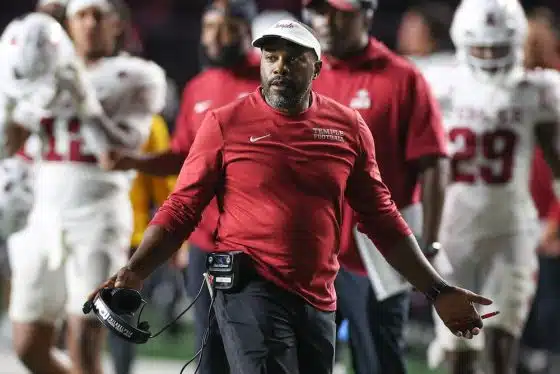Writer: Kevin Durso
Sophomore Starter: All eyes on Foles in second season
Nick Foles started the Philadelphia Eagles Week 6 game against the Tampa Bay Buccaneers on Oct. 13. He completed 22 passes for 296 yards and three touchdowns. That was the beginning of the Nick Foles era in Eagles football.
Foles made six starts at the end of the 2012 season before taking a back seat to Michael Vick to open 2013. Following his Week 6 success, Foles became the clear choice for starting quarterback.
His numbers were impressive and record-setting. He threw 27 touchdowns with just two interceptions. He completed 64 percent of his passes to various targets. He tied an NFL record, throwing seven touchdowns against the Oakland Raiders in Week 9.
Foles nearly led the Eagles to a playoff win, if not for the defense’s inability to make a stop in the closing minutes of the Wildcard loss to the New Orleans Saints.
As it is for Chip Kelly, this is Year 2 for Foles. There are doubters that Foles was a one-hit wonder and not a franchise quarterback. Amid the speculation that his success will be short-lived, all eyes will be on Foles in 2014.
Success came quickly for Foles, who turned in one good week after another. It’s quite honestly something that may be impossible to replicate. Foles warned that his 2013 season may be as good as it gets.
“Our team isn't measured by my 27-2,” Foles said. “Can I be a good-enough leader to where I can make these guys better players around me to where it makes the team better and we win? Now, I might not ever reach those [statistics] again. I want to get better and I want to be a better player. But if you're just looking primarily at statistics, you might not ever.”
It’s fair to give Foles that. You can’t expect him to throw seven touchdown passes a game. That’s not natural.
But Foles will need to repeat his success in some capacity. It’s not the number of touchdowns thrown or interceptions he gives the opposition, but the ratio that indicates how much it’s happening.
If Foles throws upwards of 40 touchdowns or more in a full season and barely surpasses 10 interceptions, that 4-to-1 ratio is still excellent.
But hold to 30 touchdowns in 16 games – not 13 as it was in 2013 – and throw 10 to 15 interceptions, that 2-to-1 ratio won’t cut it.
That’s what people will be looking at with Foles on an individual level – how he improves as a passer.
There is also the part that is out of his control. His regime has changed drastically. There will be no more Foles to DeSean Jackson connections. It is now Jeremy Maclin – who missed all of last season with a knee injury – and rookies Jordan Matthews and Josh Huff.
It’s almost a certainly that Foles will face adversity at some point in the season. The test for Foles in 2014 is the same as it is for Kelly: how can he sustain success?
"I know I say it over and over again, but all those throws that happened last year, the TDs, whatever, it does absolutely nothing," Foles said. "It probably hurts me more now than it did last year because I did it, so now you've got to do it even better. In my mind, I want to do even better.
In Kelly’s mind, another year is a chance to grow. But the learning curve is also gone for Foles.
"I think he's a lot more comfortable in what we're doing offensively, just because it is Year 2," Kelly said. “I think he can improve on everything, and I think he'll be the first to tell you that, too. But I think all the great ones feel the same way, that there's every aspect of their game that they can constantly improve, and I think that's what makes Nick really special — that he's never really content with where he is."
Much like Kelly, Foles has to prove he’s a legitimate starter. He opened eyes and turned heads in 2013. All eyes are on him in 2014. A return to the playoffs and a playoff win would be enough to identify him as a franchise player.
But like his head coach, Foles has a lot of tricks up his sleeve. Soon we’ll see what unfolds.
Kevin Durso is a contributor for Eagledelphia. Follow him on Twitter @KDursoPhilsNet.












































